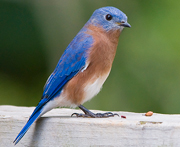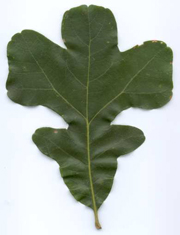Level: 5th Grade
Standard: S5P2c
You’ve collected leaves, but have you experimented with them? Try this chemistry experiment to find out why leaves change color.
Level: Various
Click here for an archive of classroom science activities.
Leonids Meteor Shower
November 17, 18 - The Leonids is an average shower, producing an average of up to 15 meteors per hour at its peak. This shower is unique in that it has a cyclonic peak about every 33 years where hundreds of meteors per hour can be seen. That last of these occurred in 2001. The Leonids is produced by dust grains left behind by comet Tempel-Tuttle, which was discovered in 1865. The shower runs annually from November 6-30. It peaks this year on the night of the 17th and morning of the 18th. The waning crescent moon will not be much of a problem this year. Skies should be dark enough for a good show. Best viewing will be from a dark location after midnight. Meteors will radiate from the constellation Leo, but can appear anywhere in the sky.
Source: seasky.org
Previous Issues
"Secrets of the Forest" LIFE, May 1990

AAC November Meeting
Date: Saturday November 15, 2014
Location: Fernbank Science Center
2:00 PM: Beginners Class. This is a short 15 minute class followed by a Q & A. It is designed to help put beginners on a quick learning track. This should make it easier to get up to speed and enjoy all the various aspects of Astronomy. Each month will feature a different subject.
3:00 PM Main Meeting. Dr. Bram Boroson's talk "Twinkle Twinkle Little Star." Neutron stars are only about 20KM across and literally flicker (twinkle) in their X-ray emissions at rates ranging from milliseconds to months or years. Dr. Boroson's talk will explore the time variable X-ray sky, in particular methods to distinguish neutron stars from black holes and other physical systems that may have analogous flickering.
How to Buy a Telescope
Date: Saturday November 22, 2014
Time: 3:00 PM
Location: Fernbank Science Center (directions)
This program, presented by the Atlanta Astronomy Club, is for anyone considering the purchase of a telescope as a holiday gift or at any other time. We will discuss the different types of telescopes and what you can see with each type. Consideration will be given to your budget and the age appropriateness of a telescope. Our purpose is to encourage an interest in Astronomy & all the other related sciences. Please join us. All Atlanta Astronomy Club meetings and events are free and open to the public.
Squishy Physics Photo Contest
The Squishy Physics Food Photography Contest gives metro Atlanta Middle and High School Students an opportunity to showcase their photographic talents. Students must to provide one 8” x 10” photographic entry with thought-provoking physical characteristics related to food specifically protein, fish, eggs or cooking. Prizes will be awarded to contest winners based upon appearance, creativity and the connection between science and cooking.

From Earth to the Universe is a collection of astronomical images that showcase the most dramatic views of our Universe. The images represent the incredible variety of astronomical objects that are known to exist – planets, comets, stars, nebulae, galaxies and the clusters in which they congregate. Click here for more information
Georgia Teacher Workshop in Paleontology
Dr. Christy C. Visaggi Georgia State University
Saturdays: Nov 1, Nov 15
Mapping Georgia Through Deep Time: Exploring Fossils and the History of Life using Place-Based Learning in K-12
Click here for more information
Science Article of the Month
Running robots of future may learn from world's best two-legged runners: Birds - With an eye toward making better running robots, researchers have made surprising new findings about some of nature's most energy efficient bipeds -- running birds. Their skills may have evolved from the time of the dinosaurs and they may now be superior to any other bipedal runners -- including humans. Read more >> | More Articles >>
Do you have a question or a suggestion?
Please email us at:
fernbankmail@fc.dekalb.k12.ga.us

Teacher Resources
![]()
Children's Science
Newsletters
Bird of the Month

Can you I.D. this Bird?
Get the answer in the next issue.
Previous Issue:Common Nighthawk Archive
Tree of the Month

Can you I.D. this tree?
Get the answer in the next issue.
Previous Issue:Sweet Gum
Archive
Molecule of the Month

Do you know this molecule?
Get the answer in the next issue.
Hint:Important in leaf color; also an acid/base indicator
Previous Issue: Benzene
Archive

